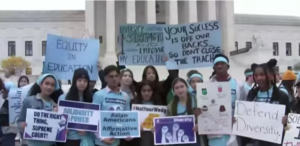Photos: YouTube Screenshot\Wikimedia Commons

Today’s U.S. Supreme Court decisions striking down affirmative action programs in college admissions is being roundly rebukes by national figures and organizations.
Today’s affirmative action decisions revolved around two college cases: Students for Fair Admissions v. Harvard; and Students for Fair Admissions v. UNC. The vote was 6-2 in the Harvard case and 6-3 in the UNC case.
U.S. Secretary of Education Miguel Cardona issued the following statement on the Supreme Court’s ruling on college affirmative action programs:
“Today’s Supreme Court decision takes our country decades backward, sharply limiting a vital tool that colleges have used to create vibrant, diverse campus communities. Students of color have long faced inequities in education and college access, and today’s ruling is yet another blow to the fight for equal opportunity. As we consider today’s decision, our commitment to educational opportunity for all Americans is unshaken, and our efforts to promote diversity in higher education are undeterred. The Department of Education is a civil rights agency, committed to equal access and educational opportunity for all students.”
“I want to send a message to all aspiring students, especially Black, Latino, Asian American, Native American, Alaska Native, Native Hawaiian, Pacific Islander, and other students from underserved communities: we see you and we need you. Do not let this ruling deter you from pursuing your educational potential. Our colleges and our country itself cannot thrive and compete in the 21st century without your talent, ingenuity, perseverance, and ambition.
“To our higher education leaders reviewing the decision: now is not the time to lessen your commitment to campus communities that reflect the rich diversity of this nation, which enhance the college experience in myriad ways and prepare students from all walks of life to live, work, and lead our democracy together. Your leadership and commitment to ensuring our educational institutions reflect the vast and rich diversity of our people are needed now more than ever. The Biden-Harris Administration is committed to supporting you in pursuing all lawful practices that meet that goal. We will continue working with you to raise the bar for inclusivity and work intentionally to better support students of color, because the inequities that exist in higher education access and outcomes remain unacceptable.”
American Federation of Teachers President Randi Weingarten issued the following statement on the Supreme Court’s decision in Students for Fair Admissions v. Harvard; Students for Fair Admissions v. UNC:
“Make no mistake: Today’s draconian ruling by the Supreme Court is a catastrophic decision that will have dire outcomes for millions of Americans for decades to come. This decision ignores the original sin of this country—it’s a throwback to a cruel, racist past that admissions policies like this tried to repair. This decision doesn’t simply end affirmative action, it has huge consequences for public life far beyond higher education. Ignoring the facts before them, the majority pretends that both discrimination and the effects of discrimination simply do not exist and do not need to be tackled.
“Justice Sonia Sotomayor is right when she writes in her dissent that ‘the Court subverts the constitutional guarantee of equal protection by further entrenching racial inequality in education, the very foundation of our democratic government and pluralistic society.’
“This is nothing more than politically charged, regressive policymaking from the bench. It’s long past time that Congress fulfills its responsibility in reining in a dangerous court that routinely issues unacceptable, unpopular and damaging opinions in the name of a partisan agenda. Our fight for justice will continue—but this decision is a stain on our nation’s principles that will not be so easily reversed.”
New York State Board Of Regents Chancellor, Lester W. Young, Jr., and Commissioner of Education Betty Rosa released the following statement:
“The New York State Education Department (NYSED) and Board of Regents are deeply disappointed in the Supreme Court’s decision on affirmative action and race-conscious admissions policies but will use every means available to ensure the guiding star of our work remains equitable access to higher education for all students.
“NYSED and the Board of Regents launched an initiative to advance diversity, equity, and inclusion in schools across New York State, prioritizing the development and strengthening of policies that advance these important principles and practices in our schools and colleges.
“Together with NYSED, New York State’s public and private colleges have a longstanding commitment to address diversity and access for underrepresented and underserved students, including students of color. As a state, we have a commitment to ensure that all voices have a seat at the table. We are encouraged by the continued and renewed fidelity of our colleges to create and maintain diverse and inclusive college campuses. In addition, the Department’s Office of Postsecondary Access, Support, and Success (OPASS) oversees many initiatives that are designed to increase the number of economically disadvantaged and under-represented groups at colleges and universities statewide.
“While we expect the recent ruling will create challenges, our commitment to ensuring access and equity for our underserved, underrepresented students is strong and steadfast.”
Columbia University Spokesperson Ben Chang released this statement:
“The Columbia University community represents a wide array of experiences and backgrounds. This diversity is central to our identity — it reflects the cultural richness of New York City as well as our mission to foster meaningful interactions and prepare students to make a difference in the world.
‘We are reviewing the Supreme Court’s decision and will refrain from commenting further until we fully understand its implications. As we prepare to comply with the law, our commitment to our values is unwavering. Diversity is a positive force across every dimension of Columbia, and we can and must find a durable and meaningful path to preserve it.”
Becky Pringle, President of the National Education Association said:
“Most of us want a country, schools and a future that includes all of us and where we all belong. But for too long, color-coded barriers have been used to prevent Black, brown, and Indigenous people from accessing the opportunities we all deserve and seek to achieve our dreams. With this decision, the Supreme Court has reinforced those barriers.
“We are stronger when our country, communities, schools, and future includes and reflects all of us. Today’s decisions by an out-of-touch and hyper-conservative Supreme Court are yet more evidence that the court is not working for all of us. The White House and Senate must hold the Supreme Court to the same laws and standards as the rest of us. And the White House and the Senate must continue to fill all judicial vacancies with qualified, fair-minded individuals who are committed to civil and human rights and social and economic justice so that our legal system can serve us all.”
Congressman Jamaal Bowman (a former principal) released the following statement in response to today’s Supreme Court decision:
“The Supreme Court has yet again taken us back in time by barring institutions of higher education from using race-conscious admissions policies. These policies are critical to ensuring that our Black and brown students, who have already experienced redlining and systemic underinvestment in their schools and communities, have an equitable shot at higher education to pursue their dreams.
“We all benefit from diversity in our schools. It is the key to learning from and understanding each other. Our education system is already plagued with inequities, from racially biased standardized testing to legacy and donor-based admissions that favor generational wealth. Affirmative action is essential to racial and economic justice in education. We must commit to fighting back against this devastating decision and to promoting equitable access to higher education for our Black and brown students. This means canceling student debt, ensuring everyone has access to free public college, and passing my Fair College Admissions for Students Act, which would end the legacy and donor-based admissions practices that favor the white and wealthy. Our democracy depends on equity in education from preschool to college to vocational school and beyond so that every young person in our country has access to the tools they need to unlock their brilliance and reach their full potential.”
U.S. Representative Ritchie Torres (NY-15) issued the following statement:
“We are reminded yet again today that we are not a colorblind nation – and that the reality and legacy of systemic racism is alive and well in America. The Supreme Court’s decision to gut affirmative action not only overturns decades of precedent and progress toward increasing minority representation at colleges and universities – it affirms there are limits to achieving the American dream for non-white people and students in this country. This is an outrageous ruling by a group of activist judges – and it will have a devastating impact on communities of color like mine who have historically been denied equal opportunity at higher education. We must continue to fight to build a more just and more equitable future where everyone has a fair shot at making a better life for themselves. Diversity is our nation’s strength – not our weakness.”
Congresswoman Cori Bush (MO-01) released the following statement after the U.S. Supreme Court announced its 6-3 ruling holding that Harvard and UNC’s race-conscious admissions policies violate the Equal Protection Clause, and ending affirmative action in higher education:
“In its dedication to moving backwards, the Supreme Court has once again rolled back protections for people in marginalized communities across this country. Ending affirmative action in higher education—which the Court had already held to be legal—will have devastating impacts on our communities. Universities have historically denied Black, brown, and Indigenous people from accessing institutions of higher education. Affirmative action helped level the racist and uneven playing field. Colleges and universities must ensure students benefit from the diverse perspectives and experiences of qualified students from all backgrounds. This is yet another example of why we must double down on our efforts for Court reform, pass the Judiciary Act and reclaim democracy.”
Congressman Kweisi Mfume (MD-07) issued the following:
“Today’s Supreme Court ruling is shamefully disrespectful to the lived experiences of millions of Americans and their ancestors. The effects of 200 years of slavery and 100 years of Jim Crow laws cannot be erased or overcome without first attempting to provide educational opportunities to balance the scale of historic discrimination. Today’s destructive Court decision will over time energize a whole new generation of young people to now realize that the issue of race and skin color has not gone away, and that unfortunately, it still dominates too many aspects of the American system of higher education.”
U.S. Senator Patty Murray (D-WA), a senior member and former chair of the Senate Committee on Health, Education, Labor, and Pensions (HELP), issued the following statement on the Supreme Court’s decision in Students for Fair Admissions, Inc. v. President and Fellows of Harvard College and Students for Fair Admissions, Inc. v. University of North Carolina:
“For decades, affirmative action has helped open the doors of higher education to communities who have long been denied the same educational opportunities. It has helped make our educational system—and our country—more fair and just.
“Today’s decision from the Supreme Court removes a critical tool in ensuring equity in college admissions. It doesn’t do anyone any good to pretend that race-based discrimination never existed in America or that serious inequities don’t still remain today. We absolutely can’t pretend this country has not denied Black, Latino, and so many other students the same opportunities as their white peers; we should be learning from our history and working to right those wrongs.
“Now, it’s on all of us to continue the fight to make the promise of equitable educational opportunities a reality for all, and ensure that every kid can achieve their dream of a higher education—no matter their zip code, income, race, or background.”
Rev. Al Sharpton, President and Founder of the National Action Network (NAN), condemned the Supreme Court’s decision today to overturn affirmative action in higher education.
“The Supreme Court just stuck a dagger in the back of Black America. Affirmative action was a commonly embraced policy because it served as a check on an admission process that was rife with racism, nepotism, and favoritism for generations. The reality is race plays a factor in admissions, from pre-K to post-doctorate, and institutions just saw their best tool for fairness outlawed.
“Let’s not forget this wasn’t a decision supported by higher education institutions. It was pushed by a small group committed to peeling away our civil rights, who want Black and Brown faces out of their ivory towers. It’s why you saw so many colleges and universities batten down the hatches and come up with contingency plans when it became clear affirmative action would end. The National Action Network’s Youth Huddle will continue to push for fair admission standards, so they have the same access to higher education as those before them. Today’s misguided decision has activated them to stand at the vanguard of the March on Washington on August 26th, which will not be a commemoration but a continuation in the fight for justice and equality.”
Southern Poverty Law Center and SPLC Action Fund president and CEO, Margaret Huang, said the following:
“Racial equity and diversity in higher education is a national imperative. Today’s U.S. Supreme Court decision overturns decades of legal precedent and erodes meaningful progress toward inclusion and equal opportunity on college and university campuses across the nation.
“Historically, communities of color have been held back from educational opportunities because of racial discrimination. Race-conscious affirmative action practices help address systemic barriers and create crucial pathways for Black and Brown people to access higher education.
“This is an attempt by anti-civil rights activists to divide communities of color on this issue – and we will not let it succeed. We remain committed to working together to protect and advance decades of racial progress. Our multiracial democracy benefits when everyone has an equal opportunity to learn and thrive.”
NAACP President & CEO Derrick Johnson released the following statement:
“Today the Supreme Court has bowed to the personally held beliefs of an extremist minority. We will not allow hate-inspired people in power to turn back the clock and undermine our hard-won victories. The tricks of America’s dark past will not be tolerated. Let me be clear – affirmative action exists because we cannot rely on colleges, universities, and employers to enact admissions and hiring practices that embrace diversity, equity and inclusion. Race plays an undeniable role in shaping the identities of and quality of life for Black Americans. In a society still scarred by the wounds of racial disparities, the Supreme Court has displayed a willful ignorance of our reality. The NAACP will not be deterred nor silenced in our fight to hold leaders and institutions accountable for their role in embracing diversity no matter what.”
The Center for Policing Equity said this:
“Today’s disturbing Supreme Court ruling demonstrates clearly the need for the very thing it strikes down: national redress for the ongoing legacy of enslavement, Jim Crow, and the court’s 2013 disembowelment of the Voting Rights Act. In their dissents, Justices Jackson and Sotomayor told the truth that the majority has chosen to disregard.
“Ignoring race will not equalize a society that is racially unequal,” Justice Sotomayor wrote. “What was true in the 1860s, and again in 1954, is true today: Equality requires acknowledgment of inequality.”
“And in the words of Justice Jackson, “gulf-sized race-based gaps exist with respect to the health, wealth, and well-being of American citizens…. With let-them-eat-cake obliviousness, today, the majority pulls the ripcord and announces ‘colorblindness for all’ by legal fiat. But deeming race irrelevant in law does not make it so in life.”
“The Court’s majority has chosen to rob the country of its right to the truth of our own history, and in doing so, robs us of the most essential tool for building a just society. Affirmative action did not introduce the issue of race to the college admissions process; it served as a small and incomplete correction of a system that was designed to serve White people at the expense of everyone else. The destruction of Affirmative Action by a radicalized court moves us further down the road to a return of the worst forms of legalized White supremacy.
“At the Center for Policing Equity, we are wholly devoted to dismantling the systemic racism that pervades this country’s public safety systems, not least, its legal codes. Today’s Supreme Court ruling underscores the urgency of our work, and strengthens our commitment to staying the course to advance the work of racial liberation.”
The Center for Constitutional Rights issued this:
“This loss, while devastating, is unsurprising. The Roberts Court has arguably been the most hostile to racial justice and Black civil rights since the post-Reconstruction Plessy Court, which rejected the promise of the 13th, 14th, and 15th Amendments for the horror of Jim Crow. This Court’s obsession with “colorblindness” – a concept nowhere reflected in the Constitution or the lived reality in this country – is a euphemistic mask for maintaining a default reliance on white supremacy. Such “neutrality” has helped perpetuate centuries of systemic segregation, brutality, mass criminalization, and the associated diminution of Black political power and wealth.
“After all, the Roberts Court cares nothing about white-centered forms of preferential treatment, such as legacy admissions. While white students continue to dominate elite campuses despite their alleged unfair treatment under affirmative action, legacy admissions – because of the very history of racial exclusion in education – categorically exclude almost all Black, Latinx and Indigenous students.
“But the ideology of white supremacy on display gets even worse – or at least more naked. The Court actually green-lights continued race conscious admissions in military academies, signaling that in the United States, it is okay – even necessary – to recruit and train Black, Indigenous and Latinx students to fight U.S. wars of aggression but not to recruit and train them to be doctors, lawyers, teachers, and leaders.
“This Court consistently chooses to ignore continuing racism throughout the secondary school system, which is designed to prepare students for higher education. At the same time, it continues to deny the patent race-consciousness of the Reconstruction Amendments which, along with related civil rights statutes, promised radical transformation of politics in this country. Their explicit purpose was to repair, through special consideration, the distinct and brutal deprivations of slavery and its afterlife – those “badges and incidents” – which persist to this day. Ignoring the purpose of the Reconstruction Constitution, the Court traffics only in the 1787 slavery constitution, here protecting a modern manifestation of white property rights to keep previously excluded people from entering the institutions that can support their thriving.
“With this decision, the Court grotesquely co-opts and distorts the reasoning of Brown v. Board of Education and its heroic advocate, Thurgood Marshall. Brown and its progeny were designed to end what the Court now calls race neutrality – known at the time as “separate but equal.” No amount of gaslighting by the right-wing ideologues who have captured this Court should obscure the fact that the aim of Brown and Reconstruction was to produce race-conscious justice. To suggest, as this Court does, that taking race into account to help those that society has historically repressed is the legal or moral equivalent of using race as a reason to repress is confusing the medicine for the disease. Integration is not segregation.
“Through no fault of advocates, the longstanding focus on race-consciousness as a means of promoting diversity, as opposed to remediating centuries of racist discrimination and exclusion, was always insufficient. The project of affirmative action should be one of recognition and repair.
“Our task is to continue to mobilize and organize to dismantle the vast structures of discrimination in our society – in schools, police departments, prisons, courts, financial institutions, and legislative bodies – and to build towards a transformed society that ensures meaningful democratic participation for Indigenous, Black, Latinx, and other marginalized communities. That, more than an elite university education, will be the source of ultimate liberation for the millions of people harmed by today’s ruling.”
FPWA CEO Jennifer Jones Austin released the following statement in response to the Supreme Court’s ruling striking down affirmative action in college admissions.
“As an organization committed to dismantling systemic racism, FPWA denounces the Supreme Court’s decision to strike down affirmative action in the college admissions process. Since Affirmative Action’s inception, opponents have ignored the reason for race to be a consideration—to responsively acknowledge racism and how it impacts people of color’s lives, and particularly their educational experiences and lifelong opportunities. They have attacked the policy for being anti-meritocratic and unfair to deserving students. Today’s Supreme Court’s decision embraces their false narrative and willfully disregards persisting structural racism and resulting intergenerational inequality and inequity.
“FPWA will continue working to dismantle structural and institutional barriers that have persisted for over 400 years in America, and will fight to advance policies that promote racial and economic equity.”
This comes as FPWA’s latest analysis of civil rights progress since the 1963 March on Washington shows persisting racial inequities in education and economic-related outcomes. Funding disparities between schools with majority Black students versus majority white students remain especially stark, and even with comparable or identical college degrees, Black people make an average 20% less each year.
Dr. W. Franklyn Richardson, Chairman of the Conference of National Black Churches (CNBC), issued the following statement in response to today’s Supreme Court ruling.
“The Black Church is repulsed by the Supreme Court’s decision to end affirmative action. The conservative makeup of the bench has turned on the fundamental principles of the constitution. Higher education should be a right for Black Americans to equally climb the opportunity ladder, and affirmative action was in place to keep it steady and secure.
“Our response must be seen and felt in November – not only this year but in the years to come. We much not get weary. We must not be discouraged. We must take this assault as an occasion to renew our resolve. Ours is an intergenerational fight. It is a continuous journey toward making this country fulfill its declared intention of equality for all.
“We will not be despaired. We will not be discouraged. And we are not disillusioned. We know the nature of the enemy and we are ready for the battle.”
AAMC (Association of American Medical Colleges) President and CEO David J. Skorton, MD, and Frank Trinity, JD, AAMC chief legal officer, issued the following statement on the decision in Students for Fair Admissions v University of North Carolina and Students for Fair Admissions v Harvard:
“We are deeply disappointed with the U.S. Supreme Court’s decision to dismantle its longstanding precedent in the 2003 case, Grutter v. Bollinger, which had recognized student body diversity as a compelling interest permitting the limited consideration of race in admissions. Today’s decision demonstrates a lack of understanding of the critical benefits of racial and ethnic diversity in educational settings and a failure to recognize the urgent need to address health inequities in our country.
“The AAMC, informed by decades of research, recognizes the undeniable benefits of diversity for improving the health of people everywhere. We remain committed to enhancing health professional education and practice by emphasizing critical thinking, innovation, effective communication with all patients, and increased access to patient care for an increasingly diverse population.
“In addition, the AAMC believes that a diverse and inclusive biomedical research workforce with individuals from historically excluded and underrepresented groups in biomedical research is critical to gathering the range of perspectives needed to identify and solve the complex scientific problems of today and tomorrow.
“The AAMC and its member institutions are committed to providing the most effective medical education and patient care, as well as advancing scientific discovery to improve lives in our communities. We will work together to adapt following today’s court decision without compromising these goals. The health of everyone depends on it.”
For more information on the impact of race-conscious admissions on medical education, visit aamc.org/SCOTUSadmissions.
American Medical Association President Jesse M. Ehrenfeld, M.D., M.P.H. said:
“Today’s decision by the U.S. Supreme Court undermines decades of progress centered on the educational value of diversity, and will reverse gains made in the battle against health inequities. This ruling restricts medical schools from considering race and ethnicity among the multiple factors in admissions policies and will translate into a less diverse physician workforce. Diversity is vital to health care, and this court ruling deals a serious blow to our goal of increasing medical career opportunities for historically marginalized and minoritized people.
“While our country grows more diverse, historically marginalized communities have been left behind on nearly every health indicator. A physician workforce that reflects the diversity of the nation is key to eliminating racial inequities. There is convincing evidence that racially diverse care teams produce measurably positive health outcomes for patients in historically marginalized populations. The goal is not racially segregated care, but rather a health care workforce in which racial and ethnic representation is a more common aspect of care teams.
“Recently established AMA policy reinforces our stance that medical schools must continue to make progress toward enrolling talented and highly qualified medical students in racial and ethnic groups that have been traditionally underrepresented in medicine. Eliminating health inequity requires more commitment to, investment in and support for Black, Latinx and Native American and Indigenous communities, and LGBTQ+ people. Yet, today’s ruling undermines policy that was producing positive results and improving the health of our patients, as well as making all physicians better practitioners. This ruling is bad for health care, bad for medicine, and undermines the health of our nation.”
Editor’s note: The AMA filed an amicus brief in support of Harvard and the University of North Carolina, which was cited by the dissenting Justices. An AMA Viewpoint that provides greater perspective on AMA’s views was published in advance of the Supreme Court oral arguments last fall.
The Alpha Phi Alpha Fraternity, Inc. released the following:
“The Alpha Phi Alpha Fraternity, Inc. strongly condemns the U.S. Supreme Court’s ruling which strikes down race-based admissions at colleges and universities. This majority decision overturns decades of legal precedent and will likely have a crippling impact on the racial diversity of colleges and universities for generations to come.
“Today’s landmark ruling undermines Fourteenth amendment protections, reduces opportunities in higher education, further disenfranchises students of color, and may lead to more acts of discrimination and racism at predominately white institutions (PWIs).
“The consequences of this ruling will be far reaching within American society. A less diverse student population at some of the nation’s best colleges and universities may lead to a less racially diverse candidate pool for career opportunities. This will likely exacerbate inequalities in housing, healthcare, and other critical areas of need.
“Alpha Phi Alpha Fraternity, Inc. refuses to remain silent on these trends to roll back hard-fought civil rights gains and to disenfranchise Black and marginalized communities.
“Elections have consequences, and Alpha Phi Alpha Fraternity, Inc. will continue to develop leaders and advocates to engage in all levels of our Democracy. Alpha Phi Alpha will also continue its investment in the youth to minimize the damaging effect of this ruling.”
Color Of Change‘s Rashad Robinson released the following statement:
“Today, the U.S. Supreme Court gutted key tenets of affirmative action and chipped away at protections against discriminatory college admissions. Court decisions attacking Black people aren’t isolated incidents. Decisions like this are the inevitable result of a court that has been unduly influenced by wealthy individuals and corporations that funnel resources into dark money groups focused on preserving white privilege. These same bad actors aren’t stopping at higher education. They’re trying to halt efforts to directly combat racial discrimination in every aspect of American life. In the last few years, we’ve seen harmful laws and decisions against Black wealth-building, career advancement and political power — and this affirmative action decision is the next attack in that coordinated, ongoing war against Black progress.
“Black people have long experienced systemic discrimination that has kept us on the outside looking in, shutting us out of opportunities to build economic prosperity and benefit from government investment. From lending and housing to employment and college applications, white people still enjoy unfair advantages that Black people don’t. Take Harvard University as an example: 43% of admitted white students were recruited athletes, legacy students, children of faculty and staff, or on the dean’s interest list (applicants whose parents or relatives have donated to Harvard). Without these advantages, roughly 75% of these students would have been rejected — yet there is no Supreme Court case to address these types of admissions. We need policies that eliminate those unfair advantages. Affirmative action was the kind of policy that compensated for the ongoing harm that’s inflicted on generations of Black people.
“Although the recent decision is specific to higher education, the ramifications may have a far-reaching impact. Hiring processes —particularly diversity, equity, and inclusion efforts — are now at risk of once again leaving qualified Black applicants out of good, high-paying jobs and widening the racial wealth gap. Just like education, good jobs directly impact the Black community’s ability to attain generational wealth. According to an audit conducted by Demos in 2016, “the typical white household had $111,146 in wealth, compared to $7,113 for Blacks and $8,348 for Latinos.” Income is also stratified by race; in 2013, the Census Bureau reported that “the typical white household has an income of $58,270… compared to $34,598 for Blacks and $40,963 for Hispanics.”
“Inequality and bias poison our whole society, coursing through the legal and social veins of society, and we need more antidotes for it. Even affirmative action didn’t cure it. We need more — not fewer — racial equity antidotes to overcome the discrimination in every realm of life.
“We already know what will happen if U.S. colleges, universities and corporations do not take action. When California banned affirmative action, the number of Black students in the University of California’s first-year class at Berkeley and UCLA was slashed nearly in half. Among all states that banned affirmative action, the proportion of students from underrepresented backgrounds in publicly funded medical schools fell by more than a third in just five years. With just 5.7 percent of all physicians identifying as Black, the repeal of equitable admissions processes could further reduce these numbers, making it even harder for our communities to access safe, unbiased and holistic medical care.
“U.S. colleges, universities and corporations must do what’s needed to dismantle these privilege-based systems. Our lives and livelihoods are on the line.”
The National Civil Rights Museum released the following:
Friday’s “landmark Supreme Court decision to reject race-conscious affirmative action in college admissions reminds us that the struggle for racial justice and equality continues and is ever-present. This decision creates serious challenges to bring racial equity to the nation’s institutions of higher education and undermines the decades of work that has been done to address systemic racism in our schools.
“In 1954, the Supreme Court struck down state-sanctioned segregation in public schools and found it unconstitutional. And the Civil Rights Act of 1964 went even further to protect the integration of schools and other public places. It has been almost six decades since the latter decision and although schools are not legally segregated today, we continue to see significant disparities throughout our educational system and low representation of Black and Brown students in most higher education institutions.
“This recent Supreme Court decision is a poignant reminder that the critical work to correct the generational impacts of our country’s long history of systemic racism is not finished. As Coretta Scott King wisely shared, ‘Freedom is never really won. You earn it and win it in every generation. That is what we have not taught young people, or older ones for that matter. You do not finally win a state of freedom that is protected forever. It doesn’t work that way.’
“Our mission and ongoing work at the National Civil Rights Museum to educate visitors on the American Civil Rights Movement and inspire positive social change is more important than ever. The National Civil Rights Museum will continue to highlight the monumental efforts of generations of civil and human rights leaders and serve as our local and national community’s public square – a place where we all can come together to do the work that must continue to create more diverse, equitable and inclusive opportunities for all. We invite you to visit www.civilrightsmuseum.org to learn more and join our collective efforts.”






